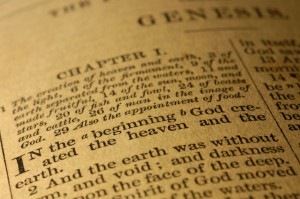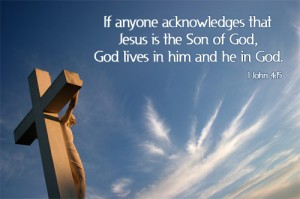Common Ground. Beliefs that are shared by Christians who accept evolution and those who do not.
I’ve been referred to as a “heretic” and an “apostate” on a number of occasions, because I accept evolution as science and as a part of Gods creation. I find this ironic as much of the anti-evolutionary and particularly young-earth doctrines and interpretations are very recent additions to Christianity. Anti-evolutionary ideas are not accepted by the oldest Christian churches and those that represent most Christians. But, I recognize that folks who use terms like these, really do think that people like myself, who embrace evolution and Christianity are creating something new and not quite Christian.
I think the answer to this sort of rhetoric is to stop and remind ourselves how much we share in common. There may be many different flavors of Christ followers, but the essentials should be the same. I think we can discuss our differing interpretations lovingly and respectfully. Knowing that we share most ideas, can help.
The following is a list of beliefs shared by Christians who accept evolution and those who do not. It was generated in the Celebrating Creation by Natural Selection facebook group which included theistic evolutionists and a number of young earthists. It is an attempt to find some common ground theologically and scientifically. If you see an error in this or would like me to consider an addition, please contact me.
Basic beliefs shared by those Christians who do not accept evolution and those who do.
We Believe:
- That Jesus was divine and the son of God.
- That Jesus was crucified and was resurrected.
- That Jesus’ death and resurrection was part of an extension of God’s
forgiveness and love in the form of a pardon for mankind’s transgressions.
- That God is the creator of all things in the universe.
- That God created the universe from nothing.
- That God continues to act creatively in the universe.
- That the Bible is inspired, authoritative, and sufficient Word of God on matters of faith and salvation.
- That some natural processes in the universe have been characterized to a high degree of predictive success without reference to God. (e. g. Newtonian Physics).
- That natural process that have been characterized to a high degree of predictive success without reference to God does not imply a lack of God’s divine providence in these phenomena. In example, we know how weather patterns are formed naturally and we believe that God created weather patterns, maintains them and can use them.

In addition Jason Anthony Sherburn, a young British, Christian paleontology student added the following list. I’ve edited it. It covers what Christians who do and do not accept evolution are most likely to agree on as meanings and purpose of Genesis chapter One.Messages from Genesis Chapter One with which Christianswho do and those who do not accept evolution can agree.

- Genesis points to our need for redemption.
- In the beginning, God. God lies beyond all existence and is the foundation of all being, the source of newness.
- 1) God created in a peaceful manner; He is the King of Peace..
- Creation displays the awesome abilities of God the artist.
- Creation should lead us to worship the creator.
- There is logic and structure to creation.
- The Sun and the Moon are not deities to be worshiped, but are useful to us.
- The universe is not structured in a way which fits astrology, but the seven days of creation prescribe the Sabbath.
- God’s acts of separating and filling show the emergence of unity with diversity through proper relationship.
- The concept of “logos” (the creative word or image of God) has its roots in Genesis with the creative words of God.
- The ten usages of “And God said” are connected to the Ten Commandments.
- God’s first act of creation suggests that the universe is filled with the light and beauty of God.
- The darkness is not created by God, nor is it eliminated by the light, but is redeemed by being set in the context of a day; this gives insight into God’s salvific presence.
- Creation is God’s temple.
- Mankind has a special place, created in God’s image, to reflect the beauty of God as His representatives in creation.
- We must therefore not defile creation.
- Man and woman are separate yet united.
- The universe has a degree of autonomy (we may differ on how much) but God is not passive. Sustenance and meaning is found in God.
- Creation is good.

I’ve been declared a “heretic” again, very recently, by a minister, because I accept evolution. Terms like “heresy” and “apostate” have an ugly history of usage by Christians justifying oppressing and murdering fellow Christians and others. The use of those terms is threatening and not Christ-like. Calling someone a heretic or an apostate seems to be meant to drive people out of the body of Christ. Given how close our essential views are, why would a Christian who does not accept evolution hold one in suspicion who does? Why would they want to cast out or threaten Christians who accept evolution? If an idea is true, it is of God.
Category: God's Word and the Natural World, Science and the Church, Theistic Evolution




